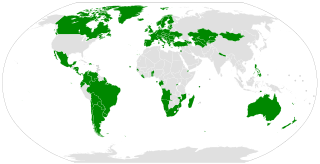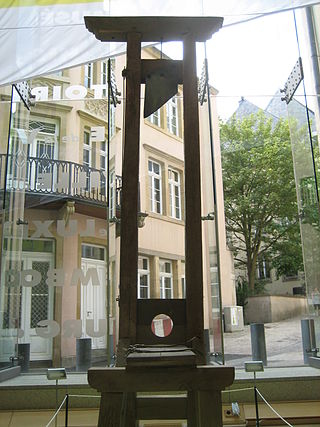Related Research Articles
Capital punishment, also known as the death penalty and formerly called judicial homicide, is the state-sanctioned practice of killing a person as a punishment for a crime, usually following an authorised, rule-governed process to conclude that the person is responsible for violating norms that warrant said punishment. The sentence ordering that an offender be punished in such a manner is known as a death sentence, and the act of carrying out the sentence is known as an execution. A prisoner who has been sentenced to death and awaits execution is condemned and is commonly referred to as being "on death row". Etymologically, the term capital refers to execution by beheading, but executions are carried out by many methods, including hanging, shooting, lethal injection, stoning, electrocution, and gassing.
Capital punishment in the Philippines specifically, the death penalty, as a form of state-sponsored repression, was introduced and widely practiced by the Spanish government in the Philippines. A substantial number of Filipino national martyrs like Mariano Gómez, José Burgos, and Jacinto Zamora, Thirteen Martyrs of Cavite, Thirteen Martyrs of Bagumbayan, Fifteen Martyrs of Bicol, Nineteen Martyrs of Aklan and Jose Rizal were executed by the Spanish government.

Capital punishment in modern Greece was carried out using the guillotine or by firing squad. It was last applied in 1972 during the military junta, and the death penalty was abolished in stages between 1975 and 2005.

Capital punishment in Latvia was abolished for ordinary crimes in 1999 and for crimes committed during wartime in 2012. Latvia is party to several international instruments which ban capital punishment.

The Second Optional Protocol to the International Covenant on Civil and Political Rights, aiming at the abolition of the death penalty, is a subsidiary agreement to the International Covenant on Civil and Political Rights. It was created on 15 December 1989 and entered into force on 11 July 1991. As of April 2022, the Optional Protocol has 90 state parties. The most recent country to ratify was Kazakhstan, on 24 March 2022.
Capital punishment is no longer applied in San Marino: the last execution was carried out in 1468 or in 1667, by hanging.
Capital punishment is not a legal punishment in the Independent State of Papua New Guinea.
Capital punishment in Kazakhstan was abolished for all crimes in 2021. Until 2021, it had been abolished for ordinary crimes but was still permitted for crimes occurring in special circumstances. The legal method of execution in Kazakhstan had been shooting, specifically a single shot to the back of the head.

Capital punishment in Luxembourg was abolished for all crimes in 1979.
Capital punishment in Nauru was used prior to its independence in 1968. Prior to the abolition of capital punishment on 12 May 2016, with the passage of the Crimes Act 2016, Amnesty International categorised Nauru as abolitionist in practice.
Capital punishment in Bangladesh is a legal form of punishment for anyone who is over 16, however in practice it will not apply to people under 18. Crimes that are currently punishable by death in Bangladesh are set out in the Penal Code 1860. These include waging war against Bangladesh, abetting mutiny, giving false evidence upon which an innocent person suffers death, murder, assisted suicide of a child, attempted murder of a child, and kidnapping. The Code of Criminal Procedure 1898 provides that "he be hanged by the neck until he is dead." For murder cases, the Appellate Division requires trial courts to weigh aggravating and mitigating factors to determine whether the death penalty is warranted.
Capital punishment has been abolished in Seychelles. The country permanently abolished the death penalty by a Constitutional amendment in June 1993.
Capital punishment remains a legal penalty for multiple crimes in the Gambia. However, the country has taken recent steps towards abolishing the death penalty.
Capital punishment in Chile is legally sanctioned, albeit with significant limitations. Since its abolition for civilian offenses in 2001, its application has been restricted to military personnel convicted of war crimes and crimes against humanity committed during wartime. This places Chile among the seven countries globally that have abolished capital punishment solely for ordinary crimes.
Capital punishment is a legal penalty in Liberia. However, Liberia is classified as a state that is "abolitionist in practice." Liberia last executed in 2000.
Capital punishment in Gabon was officially abolished for all crimes in 2010. Gabon's last execution took place in 1985. Prior to abolition, Gabon was classified as de facto abolitionist, or "abolitionist in practice," due to the length of time since their last execution.
Capital punishment was abolished in Guinea. The civilian death penalty was abolished in 2016. It was abolished under military law in 2017. Guinea carried out its last execution in 2001. Prior to its abolition for ordinary crimes in 2016, Guinea was classified as retentionist.
Capital punishment was abolished in Guinea-Bissau in 1993. The country carried out its last execution in 1986. In February 1993, the National People's Assembly (Guinea-Bissau) passed an amendment to the constitution which abolished the death penalty for aggravated murder and treason.
Capital punishment was abolished in Madagascar in 2015. The last execution in Madagascar was carried out in 1958. Prior to de jure abolition, Madagascar was classified as "Abolitionist in Practice."
Capital punishment was abolished in Namibia in 1990. The last execution was carried out in 1988, under the rule of South Africa.
References
- ↑ "ABOLITION OF THE DEATH PENALTY IN AFRICA" (PDF). Amnesty International . 3 September 2022.
- 1 2 Metekia, Tadesse Simie (2019-01-30). "Punishing Core Crimes in Ethiopia: Analysis of the Domestic Practice in Light of and in Comparison, with Sentencing Practices at the unicts and the icc". International Criminal Law Review. 19 (1): 160–190. doi: 10.1163/15718123-01901007 . ISSN 1571-8123.
- ↑ "Ethiopia's Compliance with The International Covenant". Amnesty International . 3 September 2022.
- ↑ "Criminal Code of the Federal Democratic Republic of Ethiopia" (PDF). 3 September 2022.
- 1 2 3 4 "Ethiopia's Compliance with The International Covenant on Civil and Political Rights Suggested List of Issues Relating to the Death Penalty". 3 September 2022.
- ↑ "Ratification Status for Ethiopia - UN Treaty Body Database". 3 September 2022.
- ↑ "No. 14668 MULTILATERAL International Covenant on Civil" (PDF). 3 September 2022.
- ↑ "FIACAT, ACAT Liberia and The World Coalition Against the Death Penalty Coalition Against the Death Penalty Contribution to the Second review of Liberia". Human Rights Documents Online. doi:10.1163/2210-7975_hrd-0590-2015008 . Retrieved 2022-09-03.
- 1 2 "Ethiopia carries out rare execution". Reuters. 2007-08-06. Retrieved 2022-09-03.
- ↑ "Ethiopia carries out rare execution - CNN.com". edition.cnn.com. Retrieved 2022-09-03.
- ↑ "Moratorium on the use of the death penalty". 2007-12-18.
{{cite journal}}: Cite journal requires|journal=(help) - ↑ "Suggested List of Issues Relating to the Death Penalty". 3 September 2022.
- ↑ "Ethiopia's Compliance with The International Covenant". 3 September 2022.
- ↑ "Human Rights Committee considers report of Ethiopia". OHCHR. Retrieved 2022-09-03.
- ↑ "Ethiopia - UPR". 3 September 2022.
- ↑ "Death sentences and executions 2019". Amnesty International. 20 April 2020. Retrieved 2022-09-03.
- 1 2 3 4 "Sentencing and Execution" (PDF). 3 September 2022.
- ↑ "The penal code of the Empire of Ethiopia". 4 September 2022.
- ↑ "Ethiopia lifts death penalty for over 20 former Derg officials". Sudan Tribune . 3 June 2011.